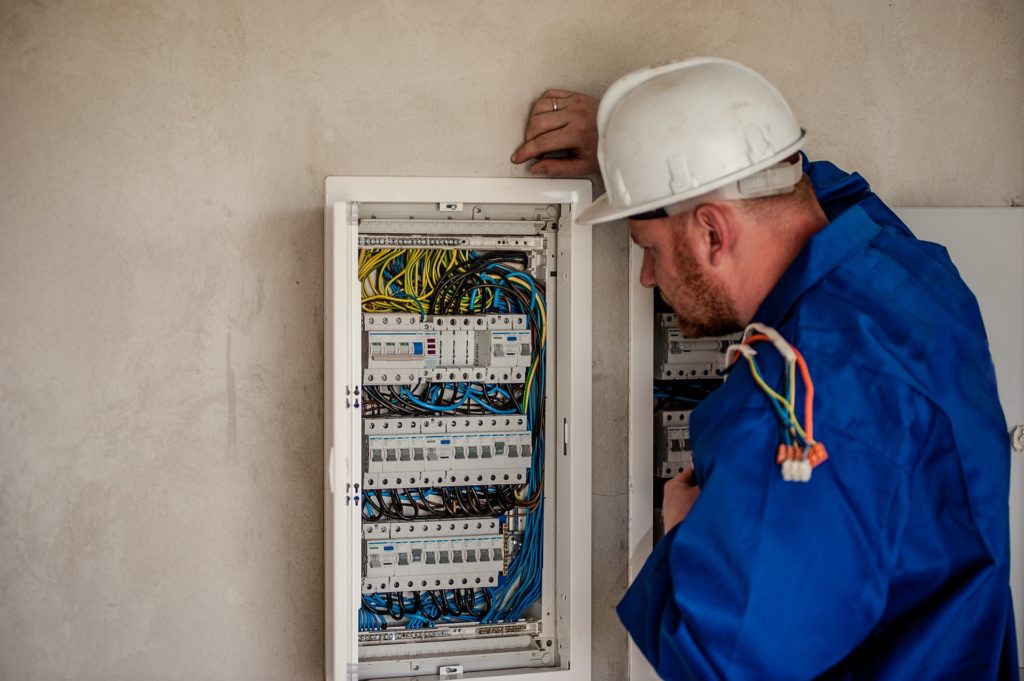In the wake of the pandemic, many businesses and industries have been forced to evolve. Even as organizations build a return-to-work strategy, their expectations have shifted; safety concerns remain, distancing is the new norm, and contactless transactions are preferred.
Most businesses in the construction industry, including electrical contractors, took a hit in 2020. At times these businesses faced acute business disruptions relating to supply chain issues and delays because of the economic shutdown. Additionally, while electrical work such as communication systems, lighting systems, control systems and security system installation remained essential, subcontractors often could not report to jobs.
Fortunately, the tide has turned and the decline of the electrical contractor industry in the previous year has given way to a much more optimistic outlook in 2021. As the construction of commercial buildings ramps back up, service companies like electrical contracting firms are beginning to see new opportunities.
In this electrical contractor industry analysis, we’re taking a look at some of the most important statistics in the electrical contractor industry. Keep reading to find out more about the industry’s forecasted strength in 2021, key opportunities for electrical contractors, and the best tools to help electrical contractors take advantage of industry growth.
General Electrical Contractor Industry Statistics
First, let’s take a look at the electrical contractor industry as a whole. The electrical contractor category is significant in its market size. The data shows that:
- The number of employees in the electrical contractor field is just under 220,000 in the U.S. (IBIS World)
- Research data shows that the US electrical contracting industry includes more than 70,000 establishments (single-location companies and units of multi-location companies) with combined annual revenue of more than $170 billion (Dun & Bradstreet First Research)
- Employment of electricians is projected to grow 8% from 2019 to 2029, far faster than the average for all occupations as homes and businesses continue to require wiring and other necessary components (US Bureau of Labor Statistic)
- In 2020, the median annual wages for electricians in the US was $56,900 (US Bureau of Labor Statistics), which is almost $20,000 above the median annual salaries for all occupations.
The Lights are On for the Electrical Contractor Industry

The future of the electrical market looks bright compared to its lagging growth in 2020! One such indicator is the health and growth of the electrical wholesale market. According to Electrical Wholesaling Magazine, there are two key trends in 2021:
- Major acquisition activity and mergers and,
- A solid sales recovery of full-line and specialty electrical supplies after the negative impact of the pandemic on the 2020 revenues.
By surveying 40+ distributor executives in the top 150 companies who gave a sales forecast, the outlook is encouraging:
- 10 expect a rebound of more than +20% in 2021,
- 17 saw an increase of +10% to +15%.
- The average for these responses was a +12.5% increase.
The historical average for annual sales growth in the electrical wholesaling industry is between +4% and +8% so these market influencers are certainly buoyant in their optimism.
Forecasted Strength in Construction Means Opportunity for Electrical Contractors
The construction industry is poised for a steady growth trajectory. According to key industry research:
- Global volume of construction is forecast to grow by 85% to $15.5 trillion by 2030. (Global Construction Perspectives and Oxford Economics sponsored by PwC.)
- Growth is expected to increase by 15.6% to reach US$ 1,515,659.4 million in 2021 with healthy and steady growth over the next four quarters despite some short-term challenges. (Businesswire)
- Over the next 4 years, the construction output in the country is expected to reach US$ 1819106.1 million by 2025. (Businesswire)
The electrical contractor industry is directly tied to the growth of the construction industry and is an integral part of new builds, as well as renovation and repair projects. According to IBIS World, the electrical contractor industry has performed well over the past five years. This was largely due to growth in the important construction markets as well as other fiscal factors including low interest rates, increasing per capita disposable income, and access to credit. However, 2020 was a challenging year impacted by a decline in the value of non-residential construction and the industrial production index. Despite this, revenue in the electrical contractor industry has:
- Increased slightly, growing at an annualized rate of 0.3% to $185.7 billion over the past five years to 2021. (IBIS World)
- Experienced an increase of 0.9% in 2021 alone. (IBIS World)
The Changing Landscape of the Electrical Contractor Industry
Like other service industries, electrical contractors recognize that the delivery of effective and efficient electrical services can be better achieved through digitization. The electrical contractor industry does not operate in isolation and must coordinate with other trades and shifting timelines including unforeseen project delays. That’s why having a centralized operating platform that enables you to manage people, inventory, time, and dollars is an essential ingredient for an industry that must stay in lockstep with the times.
Electrical contractor industry trends point to a healthy rebound over the next five years, primarily driven by non-residential and new residential electrical construction, and access to credit and investment in manufacturing structures.
To take advantage of this opportunity, electrical contractors are recognizing the benefits of an integrated mobile electrical contractor software platform that allows multiple stakeholders to share information and update projects in real-time. Investing in software allows contractors to save time by coordinating project requirements in one place, permits easy access and adjustment on inventory levels on the fly and keeps dispatcher and field service folks aligned in their objectives.
Why Electrical Contractors Need the Right Tech Tools to Compete in a Post Pandemic World

Leveraging technology and moving the industry into an era that is not defined by outdated processes is not a new sentiment. In fact, a 2017 KPMG survey stated that 72% of engineering and construction executive respondents believed technology innovation was a critical pursuit for their corporate advancement. Despite this, fewer than half had implemented strategies to move this vision forward. It’s often easier to hold the line rather than make changes, especially when people believe that what they have is good enough.
Now, mobility and access are not only expected when it comes to project management efficiency, but they are also key differentiators for electrical contractor companies. Electrical contractor industry statistics point to a dispersed and competitive landscape. The return to post-pandemic construction activity also may usher in high demand for the trades because of the high forecasted growth rate. Having the right technology tools to compete is increasingly becoming a business imperative.
Electrical Contractor Magazine published a report that reveals areas of software adoption by electrical contractors, specifically as they relate to performing necessary business tasks. Electrical contractor management software continues to deliver efficiencies to contractors by automating previously manual functions.
The following shows what percentage of electrical contractors adopt certain electrical contractor software, and the resulting benefits that service management software delivers:
- Estimating Software (68%)
- Bidding on jobs and securing business is more efficient
- Accounting/Payroll (64%)
- Syncs all financial data such as income and expenses from project planning to closeout
- Simplifies payroll management
- Promotes data accuracy
- Job Cost Control/Analysis Software (59%) – This is important because ECs reported an average of 28% of their firms’ revenue comes from either time and materials or traditional bid-build approaches
- Job costing is more easily facilitated
- Ability to track inventory and parts, and manage electrical equipment costs in real-time
- Analyzing and running intelligent reports from anywhere
- Productivity Software (58%)
- Eliminates manual work orders and unnecessary office visits
- Provides technicians with a single point of access to technical sheets and equipment records as well as service history and other site access documents and drawings
- Allows field technicians to access job files, make changes to orders, and respond to client requests from any job site.
- Project Management Software (53%)
- Allows technicians and dispatchers to update projects in real-time
- Streamlines communication through electrical-specific field service software eliminating duplicate channels like email and phone calls that can soak up precious time in keeping projects on time and on budget.
- Mobile makes it easy to complete work orders with e-signoffs while keeping both customers and technicians safe
- Scheduling Service Work/Logistics Software (53%)
- Scheduling construction projects and dispatching technicians immediately using embedded calendar functions, including GPS routing capabilities
- Time and Attendance Software (51%).
- Effectively manages field staff by making their time accountable while keeping inventory and project costs lower.
With electrical contractor industry statistics pointing to a very promising recovery, electrical contractors can look forward to industry growth that is contingent upon new ways of working.
Electrical contractor software tools can enable your company to compete in a marketplace that necessitates quick output and delivery to satisfy immediate customer needs. Electrical companies that employ SAAS platforms will have an advantage over the more manual processes of the past. If you’re not moving forward, you’re being left behind.
The Best Way for Electrical Contractors to Get Ahead
Jonas Construction Software for electrical contractors meets the complexities of your business and the types of work your business performs daily, whether your focus is on commercial, industrial, engineering/design, voice/data/video, fire alarms or any type of electrical contracting. Our electrical contractor software is designed with your business needs in mind.
With the Jonas ERP solution for electrical contractors, you can focus on managing your business, while experiencing a more streamlined operation. Our fully integrated construction software solution means that all aspects of your electrical contracting business will be connected, effectively enhancing productivity and overall efficiency. No matter your company size, Jonas can help smaller companies and larger companies take advantage of industry growth to grow and expand their electrical contractor business. Contact us to learn more about our electrical contractor software solution or request a demo today!






